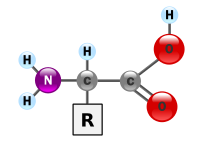
Photo from wikipedia
Methionine (Met) has important functions for homeostasis of various species, including zebrafish. However, the increased levels of this amino acid in plasma, a condition known as hypermethioninemia, can lead to… Click to show full abstract
Methionine (Met) has important functions for homeostasis of various species, including zebrafish. However, the increased levels of this amino acid in plasma, a condition known as hypermethioninemia, can lead to cell alterations. Met is crucial for the methylation process and its excesses interfere with the cell cycle, an effect that persists even after the removal of this amino acid. Some conditions may lead to a transient increase of this amino acid with unexplored persistent effects of Met exposure. In the present study, we investigated the behavioral and neurochemical effects after the withdrawal of Met exposure. Zebrafish were divided into two groups: control and Met-treated group (3 mM) for 7 days and after maintained for 8 days in tanks containing only water. In the eighth day post-exposure, we evaluated locomotion, anxiety, aggression, social interaction, and memory, as well as oxidative stress parameters, amino acid, and neurotransmitter levels in the zebrafish brain. Our results showed that 8 days after Met exposure, the treated group showed decreased locomotion and aggressive responses, as well as impaired aversive memory. The Met withdrawal did not change thiobarbituric acid reactive substances, reactive oxygen species, and nitrite levels; however, we observed a decrease in antioxidant enzymes superoxide dismutase, catalase, and total thiols. Epinephrine and cysteine levels were decreased after the Met withdrawal whereas carnitine and creatine levels were elevated. Our findings indicate that a transient increase in Met causes persistent neurotoxicity, observed by behavioral and cognitive changes after Met withdrawal and that the mechanisms underlying these effects are related to changes in antioxidant system, amino acid, and neurotransmitter levels.
Journal Title: Molecular Neurobiology
Year Published: 2020
Link to full text (if available)
Share on Social Media: Sign Up to like & get
recommendations!